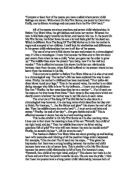Similarly, ‘*Mother…’ suggests that parent-child relationships can be restrictive, but here it is the child who struggles to choose between freedom and security, whereas in ‘Before You Were Mine’ the mother struggles between her past freedom and her present ties. Simon Armitage uses several metaphors in ‘*Mother…’ to describe the mother-son relationship. For example:
‘You at the zero-end, me with the spool of tape, recording
length, reporting metres, centimetres back to base… (ll. 5-6)
The image creates the sense that the mother is a static, reliable and secure figure in the son’s life. As she stays put, he moves around the house to measure it up. This implies the emotional connection between mother and son, he is still attached to her but is exploring his freedom. This idea is further supported by the reference to ‘span’ in line 1, which not only makes us think of a physical distance. We may also take this to refer to the son’s life span.
The form of the poem reflects the mother-son relationship. The poet breaks the phrase ‘leaving/up the stairs’ to emphasise the break between the two at this point in the son’s life. Shortly after this, the single word sentences relay the strong image ‘Anchor. Kite’, reminding us that although there is a break in the relationship there is still a deep-rooted connection. The mother keeps him grounded whilst he ‘flies like a kite’ and is free. The poem also plays with the sonnet form but again the poet breaks the 14th line to create a 15th, ‘to fall or fly’. This emphasises that the speaker is unsure whether he can survive the break from his mother. The alliteration also stresses this uncertainty.
There is an irregular rhyme scheme in the poem. Rhyme is used to connect things. At the beginning of the poem there is more rhyme such as ‘floors’ and ‘doors’. This mirrors the close connection between them. As the speaker moves further away, rhyme is abandoned. It is only reintroduced at the end of the poem, suggesting that he is beginning to find his own way.
Rhyme is also used to connect things in ‘On My first Sonne’:
‘Farewell, thou child of my right hand, and joy;
My sinne was too much hope of thee, lov’d boy’ (ll.1-2)
In this poem, Jonson does not use rhyme to show the connection between himself and his son but to portray that he associated his ‘boy’ with ‘joy’. Jonson lost his son at just ‘seven yeeres’, in fact he lost all his children before they reached adulthood. The melancholy tone is established instantly by the word ‘Farewell’; by saying goodbye to his son he is saying goodbye to ‘joy’. The regular rhythm (iambic pentameter) emphasises this effect, enhancing the tone. The poet uses the phrase ‘child of my right hand’ here not only to suggest his son’s name (‘Benjamin’ is a name linked with the Hebrew words ‘right hand’) but also to suggest that a part of him has been removed. This makes evident the intense physical pain of loosing one’s son.
‘On my first Sonne’ describes the father-son relationship as a transaction:
‘Seven yeeres tho’wert lent to me, and I thee pay,
Exacted by thy fate, on the just day.
The father felt that his son was on borrowed time. The father had ‘too much hope’ and this ‘sinne’ was paid with his death. His emotional distress at the child’s death is stressed through the use of repeated vowel sounds:
O, could I loose all father now. (ll.5)
The repeated ‘o’ creates the sound of someone sighing. A similar effect is created by the alliteration in line 7, ‘so soone scap’d worlds’. The repeated ‘s’ sounds convey distress and perhaps rage. The poet ends by saying that if he loves again he ‘may never like too much’. This implies that the parent-child relationship can be a painful in a different way; it can hurt when it is lost.
In contrast to Jonson’s obvious love for his son, ‘The Song of the Old Mother’ suggests yet another different parent-child relationship. Perhaps like the mother in ‘Before you were mine’ the mother here feels tied down by her children:
‘I rise in the dawn, and I kneel and blow…’ (L.1)
The mother is first up in the house and the first four lines contain a list of verbs, such as ‘rise’, ‘kneel’ and ‘blow’, reflecting that her life is full of hard, physical activity. The repetition of ‘and’ also implies that her life is one long list of chores. The monotony of this life can also be seen in the regular rhythm and rhyme scheme; it is regular, always the same.
In contrast, the young ‘lie long and dream’, complaining about the simplest things. The old mother sees them as ‘idle’ and is bitter at her lost youth:
While I must work because I am old,
And the seed of the fire gets feeble and cold. (ll. 9-10)
‘Old’ and ‘cold’ are linked through rhyme here, perhaps suggesting the mother is nearing death. The reference to ‘seed’ may imply that she is no longer able to conceive. The last line also links back to the fire in line two, making the poem circular to mirror the old mother’s life and work.
All four poems explore the parent-child relationship in different ways and using a range of poetic techniques. To Duffy, the mother-child relationship is a close one, but perhaps leads to regret and restrictions on the mother. This idea is echoed in Yeats’ poem where the mother is also bitter at her lost youth. In contrast, ‘On my first Sonne’ is a moving poem about the death of a child. The message here is again of regret but for different reasons. Finally, ‘*Mother…’ explores the tension between security and freedom in the mother-son relationship, using metaphor. It seems clear that parent-child relationships are full of contradictions, bringing both joy and sadness, security and freedom, closeness and regret.







